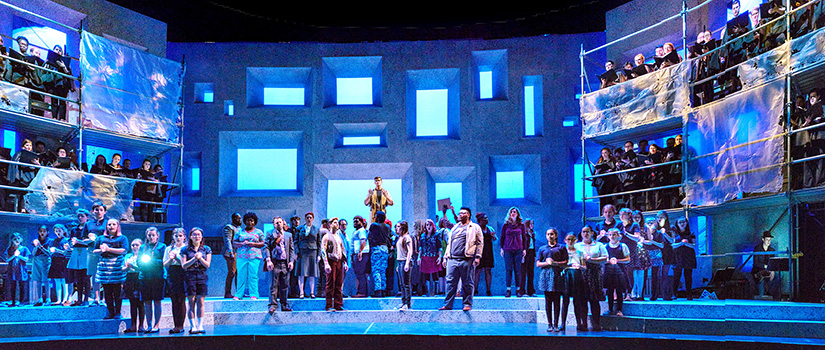The power and poignancy of music were on full display
The power and poignancy of music were on full display during the University of South Carolina School of Music’s production of Leonard Bernstein’s MASS. More than 5,300 people from around the region and beyond experienced the full-scale production of the epic work performed on March 2, 3 and 4 at the Koger Center for the Arts.
“MASS is an immense undertaking in terms of personnel, time, expense, and above all, artistic expertise. Those privileged to witness this event will not forget it,” wrote Free Times music reviewer, David Lowry. “USC's Immense Production of MASS Worth the Hype” announced the headline.
The School of Music set out to do something that the vast majority of our students could join together to do in one big production – where there would be a synthesis of all they have learned. MASS was found to be the work that would stretch both the school and the university and that would be an opportunity for various performing arts groups at USC to work together in a way they rarely do. In addition to students across areas of the School of Music, dancers from the USC dance program also took part in the massive production.
Margaret Eighmey, in her second year toward a master’s in opera theater, performed as a street singer and said “MASS was such an amazing experience. Fully staged performances are put on so rarely in the professional world, so it was amazing that we had the number of people and resources to pull it off as a university. It was definitely a piece that grew on me. I didn't really understand what to do or how to interpret it at first. When the show really started coming together in rehearsals I began to identify with my character and her confusion, and I really started to understand the importance of what we were doing.”
Andrea Vogt, a junior education major with a certificate in violin performance, said working with acclaimed tenor Kevin Vortmann was inspiring. “The first thing I noticed was his energy. He brought his best effort to every single rehearsal and laid it all out on the table. His energy lit up the room and definitely had a positive impact on the performers on stage and in the pit. My fondest MASS memory is probably the first rehearsal on stage with all 200 musicians. Hearing how everything fit together completely revolutionized the piece for me and it started to all make sense after weeks of rehearsing with the orchestra alone.”
“At the University of South Carolina School of Music, our mission is to transform lives through excellence in music. At this current time of social and civil unrest we felt it presented an apt moment for us to demonstrate that mission in a distinctive way and the 2018 centenary of Bernstein’s birth afforded us an excellent opportunity to bring this epic stage production to life and revisit the inclusiveness and hopefulness this remarkable work inspires,” said School of Music Dean Tayloe Harding.
In conjunction with MASS, the School of Music hosted Public Music Discourse: In Honor of the Bernstein Centenary, March 2-3. The interdisciplinary conference, which met jointly with Music Theory Southeast and the American Musicological Society Southeast Chapter, attracted scholars from across the U.S. and abroad. Inspired by Bernstein’s ability to communicate to a general audience about complex musical questions, participants gathered to celebrate his legacy and discuss how to carry it forward. In addition to sessions dedicated to Bernstein’s life and work, presenters focused on other historical models of public music engagement, including music criticism under Jim Crow, harmonica clubs that flourished in 1920s, and the public music theory of George Bernard Shaw. Others focused on practical matters, such as the role that music plays in political campaigns and the importance of musical analysis in copyright infringement lawsuits.
Performers premiered new compositions and spoke about engaging directly with their audiences, while others focused on social justice issues related to working with disadvantaged youths or prison inmates. Guests included not only those with academic affiliations in music, but also those outside of music, and some public music YouTubers with no academic affiliation. Several papers had pedagogical focus and revealed how these concerns are increasingly becoming part of the curricula in music schools. Not least among these was the distinguished keynote speaker, Tim Page, professor at the University of Southern California and winner of the 1997 Pulitzer Prize for Criticism. Taken together, the speakers demonstrated that while his abilities to elucidate musical issues may never be equaled, Bernstein will have many successors dedicated to public engagement in the decades to come.
Read more about MASS and the Public Music Discourse.
